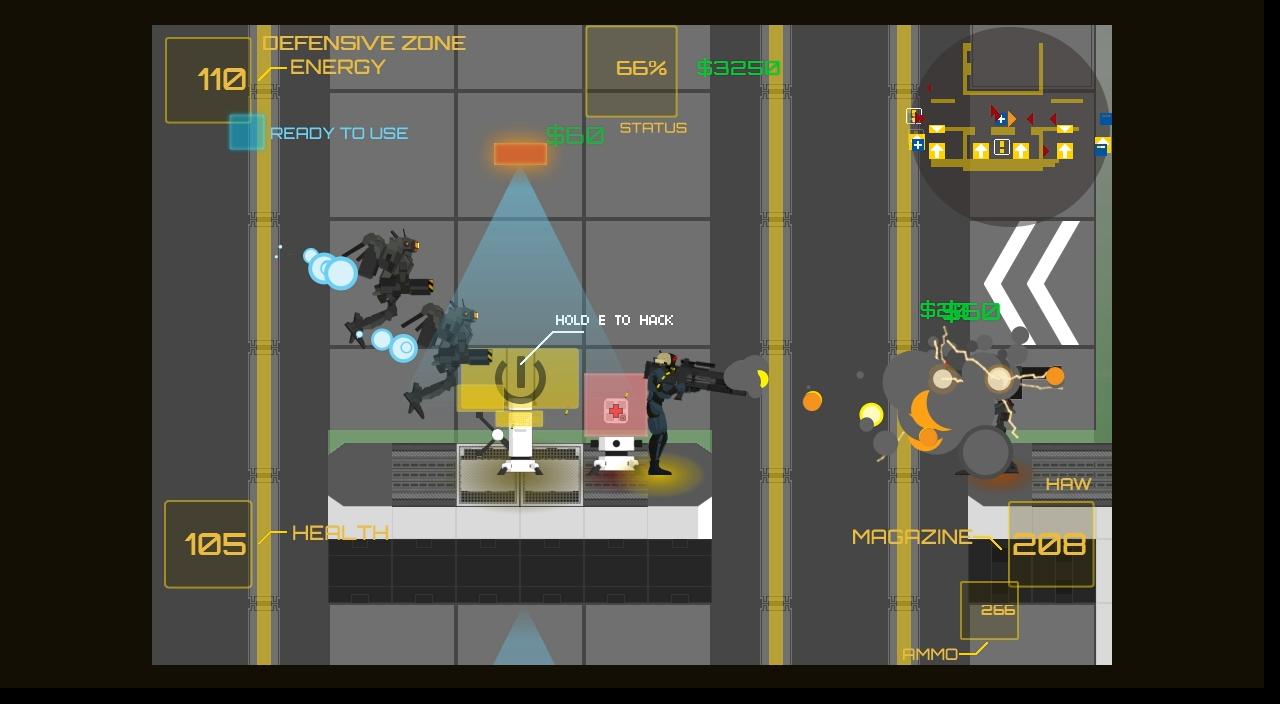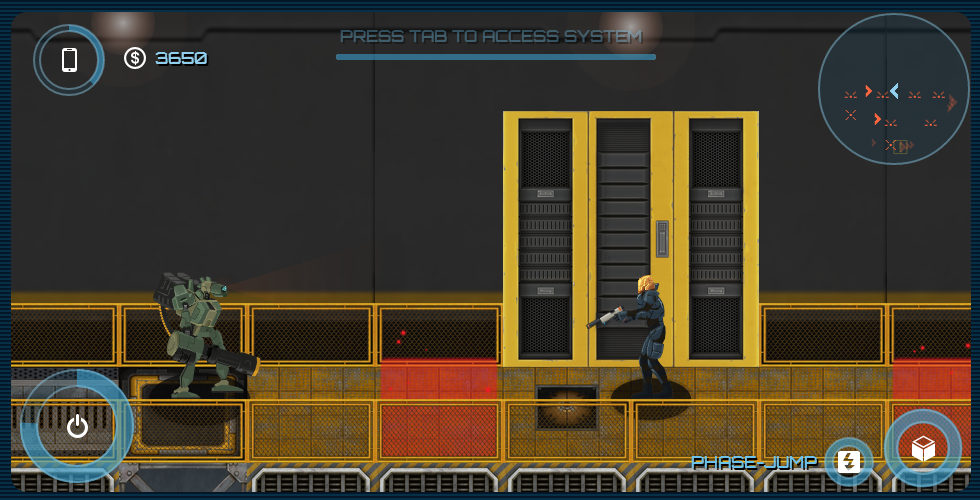
Featured Blog | This community-written post highlights the best of what the game industry has to offer. Read more like it on the Game Developer Blogs or learn how to Submit Your Own Blog Post
Post-Kickstarter Finance By The Numbers; A One-Man Studio Postmortem
In March 2013, I ran a 30 day Kickstarter for my cyberpunk 2d shooter 'Contract Work'; Although the campaign was a success, the initial public release was a dismal failure. This is a full breakdown of the money numbers and my postmortem thoughts.

I'm Kee-Won Hong, the founder of Iterative Games, and I'm working on my first title Contract Work. If you enjoyed this article, consider following me on Twitter.
Full disclosure is the primary purpose of this post. The backstory - in March of 2013, I ran a 30 day Kickstarter for my cyberpunk 2d shooter 'Contract Work'; it finished just over it's goal of $5000 with 110 backers. Although the campaign was a success, the initial public release was a dismal failure, selling only 3 copies (though many more people did play the game). This is a breakdown of the money numbers and thoughts on what worked, what didn't, and what happens now.
Final Kickstarter Total: $5086
Cost from Kickstarter/Amazon/failed pledges: $4627 (-$459)
Taxes (rough estimate after deductions applied): -$500
Personal Development Costs (I only count costs for 2 months @$1000 a month for living expenses, see notes below): -$2000
Material Costs, broken down as follows:
Subscription to GameTextures.com (7 mo at $20/month): -$140
Asset purchases from GameDevMarket.com: -$40
MediaLoot & TextFX licenses (GUI assets): -$70
Replacement Video Card: -$110
Hosting (dreamhost.com at $13/mo): -$234
Marketing (hiring a marketing firm, at discount): -$1440
Customer Acquisition (via Facebook): -$647
Freelance Artwork (multiple pieces): -$300
Freelance Content Creation (LetsPlay video): -$50
Total Cost through Sept, 2014: $5990
Total Revenue Post Kickstarter: $9.99
Note - I only count April & May of 2013 as time I spent working full-time on Contract Work while funded. I was laid off in Jan of 2013 and besides a little freelance work (~$1000 worth) I paid all my development & living costs out of pocket while planning & executing the Kickstarter. At the end of May 2013 I started contracting which turned into a full-time job. I don't the cost of developing Contract Work while working full time (but there is probably some associated opportunity cost).
The $1000/month figure for cost of living is very conservative. My rent alone is more than $1000, but I admit that I could have found cheaper lodgings (it would have taken time & money, and I hate moving). For that reason I feel that taking $1000 as my own 'salary' while using the Kickstarter funds is reasonable (the rest of my costs being paid out of pocket).
What Didn't Work
Let's start with the unhappy stuff. First the obvious - the marketing spend and customer acquisition didn't result in the sales I was looking for. Importantly, I don't blame the company I hired for my marketing campaign; they really did their best to raise awareness, even getting several articles published on bigger sites. But there was some serious cart-before-horse syndrome, as the game I was selling didn't have good marketable points. Graphics? Meh. Concept and environment? Fuzzy at best. Gameplay? Disjointed, confusing at times.

Good marketing won't save a half-baked title (in retrospect, the game really needed another 6-9 months of development time to shine). Ultimately I think the unreasonable time frame I set for myself (zero to commercial product in 9 months) doomed the marketing campaign from the start. Given the knowledge I have now, I would have avoided a traditional marketing campaign altogether.
The customer acquisition is more interesting. First, the Contract Work page has over 1,300 likes, which is not bad for the spend ($0.50 per like). However, the likes have not translated to engagement or sales; it's hard to determine whether that's due to the quality of the fans or the quality of the game. The same goes for sales - the game has a decent number of plays, so the issue with converting plays to sales may lie more in the game/ purchase process than the quantity or type of player being directed to the site.
This has also created a standing community, albeit a quiet one. I remain hopeful that users can be engaged through quality content sharing and outreach, and am planning to try expand the community in the future through organic and paid ads. Another upside is that I've collected an e-mail list of about 300 addresses from players of the game that I hope to engage as well. There is definitely potential.
If I could do it all again, I'd wait until the game was in better shape to start my community, then spend a lot of time refining the purchase process before asking people to buy the game. I always feel the first part of good marketing comes from having a good product to sell.
A last note on some of the unhappy realities of Kickstarter - it sucks seeing 9-10% disappear instantly, but worse is not accounting for the taxes on the money later. I believe just about every state Kickstarter counts as personal income for tax purposes, so plan as such.
What Worked
In terms of 'bang for buck', the clear winners were artwork & assets. This will differ from team to team, but my skillset is primarily programming with some knowledge of art. Good art takes me a long time to create and therefore it's almost always worth it for me to pay for art and focus on development. I feel I'm lucky in this regard - I can always move forward with placeholder art, while it might be more difficult to make progress without a reliable coding resource.
The GameDevMarket assets were the best value, but I've utilized the most assets (in term of raw numbers) from GameTextures. Both GameTextures and GameDevMarket are new resources that (to the best of my knowledge) did not exist when I finished my Kickstarter, but I'd expect more sites like them in the future.
My collaboration with a couple great art contractors (Pui Che and Tyler Johnson) has been nothing but delightful. Not only does it save me time but boosts my motivation every time they deliver a cool new asset. Many thanks to Robert Lockhart for referring me to these talented folks; obviously not everyone will be as good as these guys, but I feel that using personal recommendations goes a long way to finding like minded and talented people you want to work with.
 The final combination of purchased & contracted art assets.
The final combination of purchased & contracted art assets.
I've also just started contracting with the talented team at P1PR to start generating content. They've finish an excellent first look 'LetsPlay' video which has gotten good responses. Again, this is an area that requires a lot of effort and time on my part to generate quality content, so it's a good investment in my opinion.
In general - figure out your weaknesses and use your resources to counteract them. For me the biggest time sink was art; investing more early could have saved me a lot of time and effort in the long run.
What Now?
I'm working on fulfilling my backer rewards now. Even though I didn't offer any physical rewards, I did not budget enough time to finish the rewards in my original plan. I'll also be co-ordinating with my contractors for the artwork tied to these rewards, so expect the cost for contract artwork to continue to rise. I'll continue to utilize my team at P1PR to generate quality content to try engage my existing community, and use some ad spend to grow. Long term I plan to work on getting the game on Steam Early Access/Greenlight (if it still exists) as well as additional portals for distribution. But, as I've learned, it's important not to get ahead of myself; the primary goal right now is to make Contract Work a great game to play.
I've had the enormous luxury to be able to get a head start on my game through Kickstarter funding and survive a bad launch by having a full time job. The time commitment sucks, but it has given the runway and resources to put the game into a state where it has a better chance to succeed. I also feel fortunate that I planned this as a one man endeavor; no one else was ruined by a terrible launch or bad planning. On the bad days I don't have to worry about a crazy high burn rate. It can get lonely, but I know that as long as I stay motivated that Iterative Games won't die.

Winston Churchill is quoted as once saying "Success is going from failure to failure without the loss of enthusiasm". I might add that includes going from failure to failure without bankrupting yourself (too badly). So at the end of the day, even if I didn't make a cent from my first release - Contact Work is still alive, I'm still getting the chance to do what I love, and I really can't ask for more.
Many thanks again to my loyal and patient backers. I wouldn't be here without you.
Read more about:
Featured BlogsAbout the Author(s)
You May Also Like







.jpeg?width=700&auto=webp&quality=80&disable=upscale)








